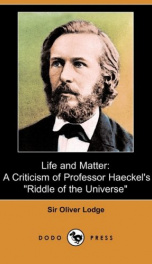Life and Matter

Sir Oliver Joseph Lodge, FRS (1851-1940), was a physicist and writer involved in the development of the wireless telegraph. He invented electric spark ignition for the internal combustion engine (the Lodge Igniter), the moving-coil loudspeaker, the vacuum tube (valve) and the variable tuner. In his Royal Institution lectures The Work of Hertz and Some of His Successors (1894) he coined the term âcohererâ and was credited by Lorentz (1895) with the first published description of the Length contraction hypothesis, in Aberration Problems (1893). He gained the âsyntonicâ (or tuning) patent from the United States Patent Office in 1898. He is also remembered for his studies of life after death. After his son, Raymond, was killed in World War I in 1915, Lodge visited several psychics and wrote about the experience in a number of books, including the best-selling Raymond; or, Life and Death (1916). Altogether, he wrote more than 40 books, about the afterlife, aether, relativity, and electromagnetic theory. His works include: Life and Matter (1905), Socialism & Individualism (1905), The Immortality of the Soul (1908) and The Survival of Man (1909).
Info about the book
Author:
Series:
Unknown
ISBN:
1272472639
Rating:
3.5/5 (4)Your rating:
0/5
Languge:
English
Users who have this book
Users who want this book
What readers are saying
What do you think? Write your own comment on this book!
write a commentGenre
if you like Life and Matter try:
Other books by this author
Do you want to exchange books? It’s EASY!
Get registered and find other users who want to give their favourite books to good hands!


